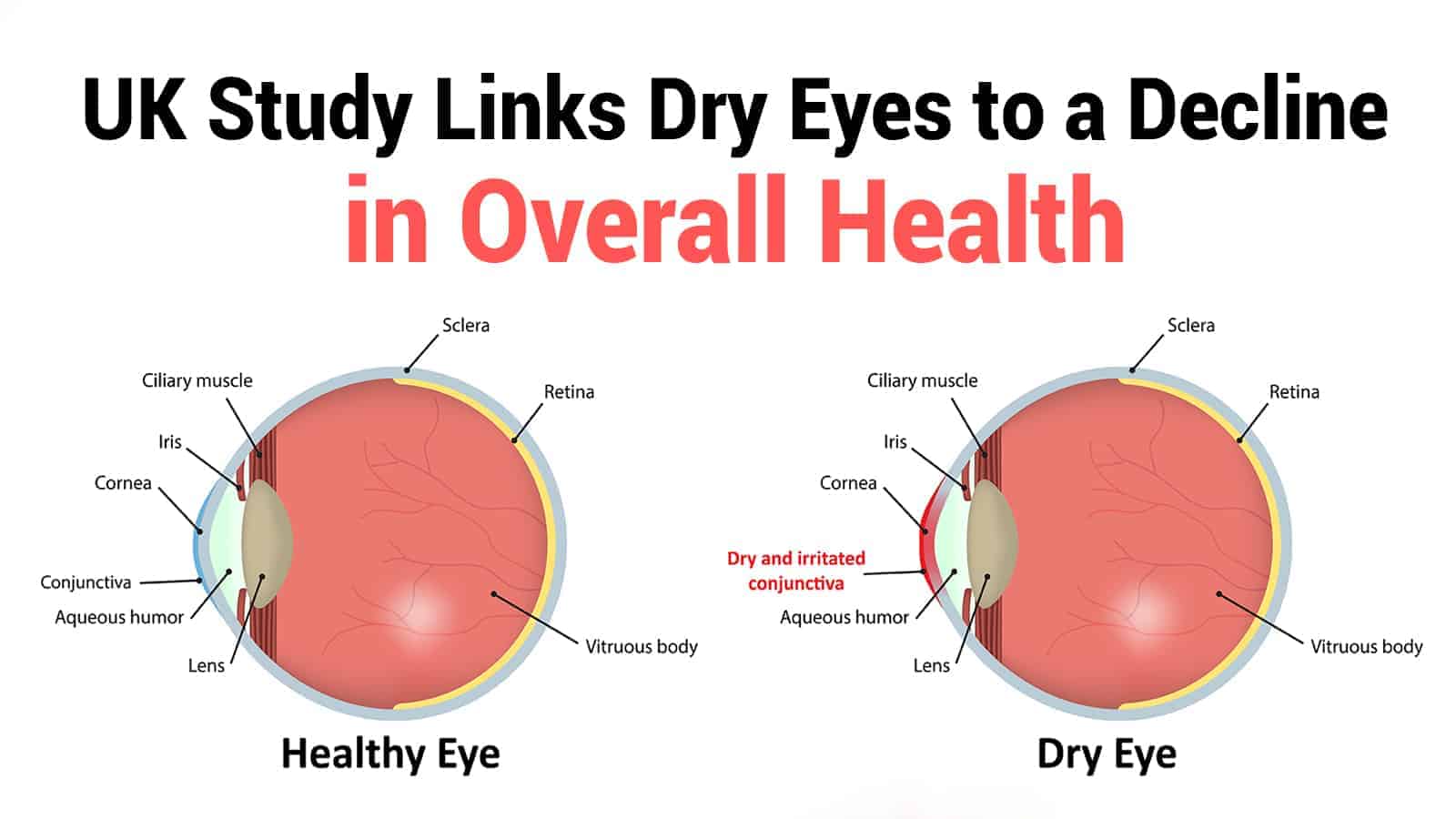A new UK study found that dry eye disease can lead to other overall health issues.
According to the National Eye Institute, nearly 16 million Americans suffer from eye dryness. The Association of Optometrists in London reports that about one in four people in the UK has the condition.
The University of Southampton study revealed that patients with chronic dry eye tend to have a lower quality of life. The findings showed that people with dry eye disease reported a decline in visual function and work productivity. They also had more difficulty completing daily activities and responsibilities.
Millions of people suffer from this condition, and it’s one of the top complaints at eye doctor appointments. People of all ages can have dry eye disease, but it occurs most often in women and the elderly. Researchers estimate that around one-third of adults over 65 have the condition. However, the actual number is likely higher because no official diagnostic test exists. Also, people with mild symptoms often don’t seek medical attention.
What is dry eye disease?
Dry eye occurs when your eyes don’t produce enough tears or make low-quality tears. These tears dry up quickly, causing the front of the eye to become dry and irritated. Sometimes, the eyes produce extremely watery tears to compensate, but these dry up quickly and result in a gritty feeling. While dry eyes can be uncomfortable, there are many treatment options available.
Common symptoms of dry eye disease include:
- irritation and redness in the eyes
- blurred vision
- a scratchy or gritty feeling in the eye, like something, is in it
- stinging or burning sensation
- extreme sensitivity to light
- soreness in the eyes
- strings of mucus in or around your eyes
- you have watery eyes (this can mean you’re producing lower quality tears, a symptom of dry eye)
- you feel pain while wearing contact lenses
Causes of dry eye, according to the American Academy of Ophthalmology:
- Being older than 65, especially if you’re a woman. (The eyes produce fewer tears with age due to hormonal changes).
- Diseases such as rheumatoid arthritis, thyroid disease, and lupus
- Blepharitis (when eyelids are swollen or red)
- Entropion (when eyelids turn in); ectropion (eyelids turn outward)
- Being around smoke, in the wind, or an arid climate
- Looking at a computer screen or phone for extended time periods, reading, or any other activity which reduces blinking
- Wearing contact lenses for a long time
- Having refractive eye surgery, such as LASIK
- Taking medication such as diuretics, beta-blockers, antihistamines, sleeping pills, psychotropics, or heartburn medication
Treatment for dry eye disease:
- over-the-counter eyedrops called artificial tears
- over-the-counter moisturizing gels or ointments to reduce redness and burning
- ocular astringents, which are decongestants used to reduce swelling and/or redness
- lifestyle changes such as switching medications that exacerbate dry eye disease, limiting screen time, or adding a humidifier to your home
The NHS reports that in 2014, doctors wrote 6.4 million prescriptions for dry eye disease. This cost over £27 million. Since so many people have this condition, the research team wanted to investigate how it impacts their lives.
The researchers studied adults in the UK specifically, using an online survey of one thousand patients with the disease. They also surveyed 1,000 adults who didn’t have dry eye syndrome.
The volunteers filled out a questionnaire given by the National Eye Institute about their visual function. They also completed a EuroQoi questionnaire on their overall health. Those who self-reported having dry eye disease answered further questions about their symptoms.
Researchers find that dry eye is associated with other conditions
The study, published in the journal BMJ Open, revealed that participants with dry eye disease had more mobility problems. They also had more difficulty completing daily tasks than those without dryness. The surveys also showed that the patients had a higher likelihood of experiencing anxiety and depression.
People with severe symptoms experienced a decline in social and emotional functioning. They also had lower work productivity, having to miss work more often due to their condition.
Dr. Parwez Hossain, Associate Professor in Ophthalmology at the University of Southampton and lead author, said: “This study provided some very useful information on the burden that dry eye disease places on patients. As well as confirming the impact on work and social lives, we also discovered that the extent of the effects are consistent with the severity of symptoms.”
While the association between dry eye and other diseases isn’t clear, the study showed an overall decline in health.
“We also found that participants with dry eye disease symptoms were a lot more likely to suffer from other comorbidities; twice as many had arthritis, hearing loss, or irritable bowel disease compared to the cohort without symptoms. Whilst we cannot draw causal associations through this study, the presence of dry eye disease does appear to impact an individual’s health and vision-related quality of life,” Hossain said.
Both groups reported similar levels of reading and screen time. However, the dry eye group reported higher exposure to environmental irritants like air conditioning, heating, and air pollution. The researchers believe that these factors could exacerbate dry eye disease or patients have more awareness.
Final thoughts: Dry eyes linked to other comorbidities and decline in overall health
Your eyes say more about your health than you thought, as this study shows. Researchers found that people with dry eye disease reported more difficulty with daily tasks and lower visual function. They also seemed to have higher instances of anxiety and depression and had to miss work more often. Twice as many dry eye sufferers had arthritis, hearing loss, or irritable bowel syndrome compared with the other group.
The researchers say the association between dry eye and the other illnesses isn’t clear without further studies. However, it does seem to affect the patients’ quality of life according to the self-reported symptoms. Hopefully, future research will yield more answers about how dry eye disease impacts overall health.















 Community
Community

